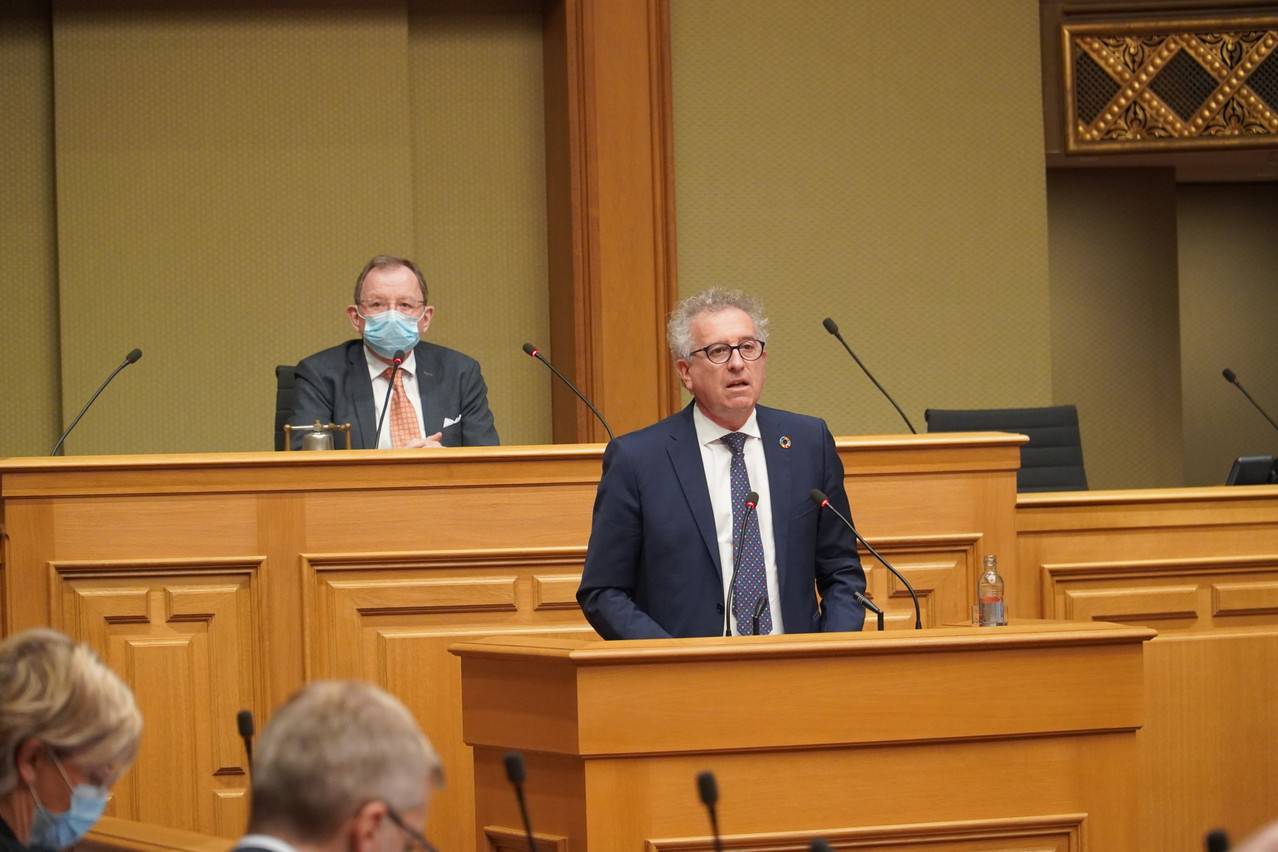"This is my tenth and last budget presentation before I hand over to Yuriko Backes at the beginning of next year. And for my last speech in the Chamber of Deputies, I am proud to show the image of a sky where the clouds are moving away,” Gramegna said on Wednesday at the beginning of his presentation on the 2022 budget. The cover of his document shows a vine with a blue sky and some clouds.
During his speech, Gramegna took stock of his eight years at the head of the ministry of finance, explaining that "the most important thing is a healthy financial situation. When I became finance minister in 2013, the sustainability of our finances was no longer certain, and the European Commission had warned that if we did nothing, the rules of the stability pact would not be respected. In the end, we are the only country in the eurozone to have respected this pact."
A "visionless" budget for the CSV
"We are among the countries that have emerged from the crisis the fastest. Statec now expects GDP growth of around 7% for this year 2021, instead of the 6% we were hoping for; our finances are healthy," insisted Gramegna. "I have presented 10 budgets to you, and I have already been told that they were either too optimistic or not optimistic enough, and these criticisms are unfounded. The state's finances are roughly in good order, and I am particularly happy to hand over the keys to with peace of mind." And, thanking MPs and members of the government, the outgoing minister hailed Luxembourg "and its fair society which is a pearl on earth. Pay close attention to it."
Gramegna's speech then gave way to debates by majority and opposition MPs all day on Wednesday.
For Gilles Roth, co-leader of the CSV fraction with Martine Hansen, this "bucolic vision of vines and blue skies is marketing. Behind the figures, it is rather illusions that prevail over substance. How can we say that we have found a way out of the crisis? I don't see a way out of the crisis, it's a budget without vision, without purpose, a budget of immobility, and also a budget of promises that have not been honoured.”
While the budget's rapporteur, Dan Biancalana (LSAP), had insisted on its social dimension on Tuesday, in Roth’s opinion "there is no social aspect in this budget".
An "ambitious" budget for the LSAP
For Gilles Baum (DP), "the 2022 budget is a good vintage for the country. GDP growth is good, and we must not forget the consequences of the pandemic. We must invest massively in the country, and I don't think like the CSV. I would like to remind you that it was the CSV that was in power and in charge of finance before 2013, when there were problems with the finances, so they are acting a bit like Doctor Jekyll and Mr Hyde.”
TLSAP fraction leader Georges Engel said the social dimension put forward by his colleague and budget rapporteur Biancalana "is very real. The 200 euro increase in the cost-of-living allowance is a very important step, and the LSAP considers that having healthy state finances is a prerequisite for having a future economy. I am pleased that we have not moved towards austerity. High investment is driving the economy, and this ambitious 2022 budget is enabling recovery."
The climate, "not detailed enough" for Déi Gréng
However, Engel added nuance to his statement, noting that "the deficit is falling, but we have to pay attention to certain elements, such as the situation of our social security, which is certainly excellent compared to that of our neighbours, but, compared to our past figures, we are on a rather downward slope. Our social systems need to be set up in a more sustainable way."
For the leader of the Déi Gréng, Josée Lorsché, "when we look at the country's finances, at the macroeconomic level, Luxembourg has been able to get through this crisis in a much better way than the other countries in the euro zone. This is thanks in particular to the aid released by the State, which represented 4% of GDP. But our country is facing enormous challenges, which require very large investments, and the risk is that our debt will increase significantly. This will therefore be one of the major challenges in the years to come.”
For the Green MP, "the issue of the climate crisis has not been detailed enough by the rapporteur, even though it impacts on all structures of society. Climate and social issues are intimately linked,” she said.
Eight motions tabled by the ADR
Fernand Kartheiser (ADR) took the opportunity to table eight motions, notably on the "realistic adaptation of the cost of housing and energy to indexation” and the reclassification of single-parent families in tax class 2 and the adaptation of the single-parent credit. "We are in favour of better spending for families," Kartheiser said.
For Nathalie Oberweis (dei Lénk)--who tabled a motion on the development of a plan to fight poverty and social exclusion--"the poverty indicator is stagnating at a historically high level, the rate of working poor is at 12% in the country. If work no longer protects against poverty, then we really do have a problem,” she said "And how is it possible that energy prices have not been taken into account when making this budget?”
Sven Clement (Pirate party), who tabled three motions, including one on "the automatic allocation and revaluation of the single-parent tax credit", explained that the social dimension, although mentioned by Biancalana, "is not taken into account enough in this budget. While Luxembourg has the highest risk of poverty since 2005. And on the subject of climate, it would be better to reward someone who consumes less CO2 than to punish someone who consumes too much.”
This story was first published in French on . It has been translated and edited for Delano.
